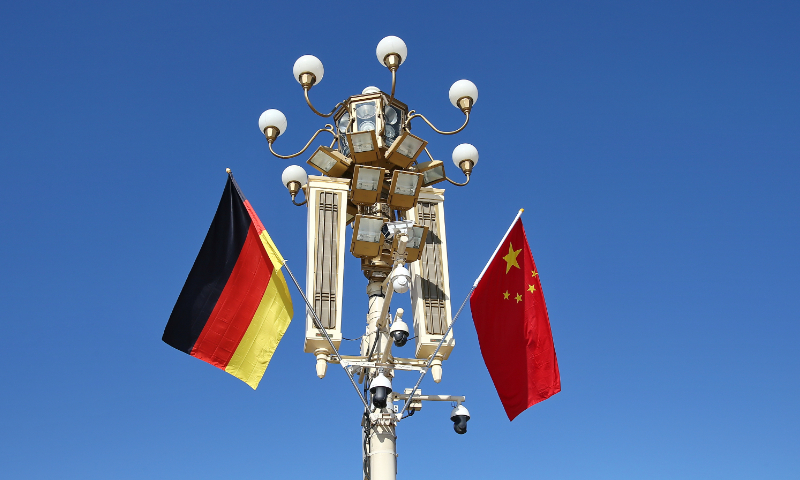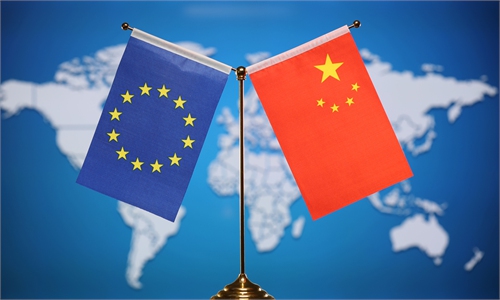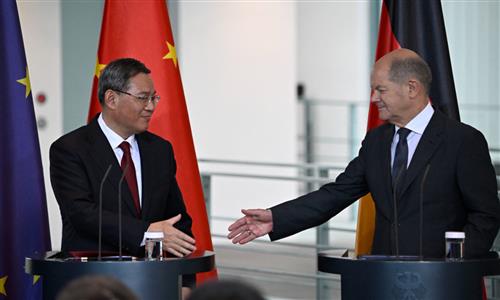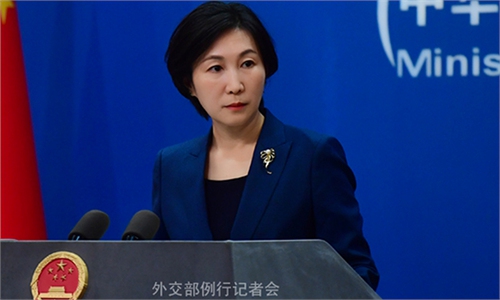MOFCOM Minister meets German business leaders, reaches consensus on opposing ‘decoupling’

China Germany Photo: VCG
China will keep improving the domestic business environment for all international enterprises, said China's Minister of Commerce Wang Wentao on Tuesday when meeting with Karl Haeusgen, president of Verband Deutscher Maschinen und Anlagenbau (VMDA), and Christian Klein, CEO of SAP.
Both German business leaders opposed "decoupling" from China, noting that the strategy is not in the interests of German enterprises.
During Wang's meeting with Haeusgen, Wang said mechanical equipment manufacturing is an important aspect of China-Germany economic and trade cooperation, and both sides should explore potential in carbon emissions reduction, the digital economy and sustainable development, further lifting the level of bilateral economic relations.
Haeusgen said that Germany and China should continue the tradition of good cooperation. "About 80 percent of German mechanical products are made for export. 'Decoupling' from China is not in the interests of German enterprises, and 'de-risking' should be assessed independently by enterprises."
The minister also exchanged views with German software provider SAP's CEO Christian Klein on China-Europe cooperation, cross-border data transfer and artificial intelligence.
China has a huge market and abundant talent reserves, as well as large-scale enterprises with strong competitiveness. "While China is building market-oriented, legalized and internationalized business environment, we welcome SAP to expand its investment in China, and become a trustworthy cooperation partner of Chinese enterprises based on its technology advantage," Wang said.
SAP opposes "decoupling" from China. Klein said SAP is seeking to build a resilient global supply chain and appealing for more international cooperation. "Next, SAP will enlarge research investment in China, and provide better services for its clients in China," he said.
"The attractiveness of the Chinese market for German enterprises keeps rising as many enterprises gain great profits from the world's largest market," Cui Hongjian, director of the Department of European Studies at the China Institute of International Studies, told the Global Times on Wednesday.
Cui said revenue and costs are two major factors that German enterprises can benefit from in the Chinese market and industry chain, and what they will lose after "decoupling" from China will double.
Some German enterprises of vehicles, manufacturing and chemical engineering, which have become deeply rooted in the Chinese market, will be the main driving force in fostering China-Germany cooperation, said Cui.
President of the German Chamber of Commerce and Industry Peter Adrian said in an interview with German media on July 9 that China is still a major market for enterprises in Germany and Europe despite diversifying global supply chains.
China and Germany are important economic and trade partners. German investment in China in 2022 hit $2.57 billion, up by 52.8 percent, said MOFCOM spokesperson Shu Jueting on May 25 this year.
"China has been Germany's largest trade partner for seven consecutive years, Germany is also China's largest trade partner in Europe, largest foreign investor and important investment destination," she noted.
Chinese Premier Li Qiang wrapped up his visit to Germany and France on June 24. During a visit to Berlin, Li attended a seminar with representatives of the German business community, including Siemens, Volkswagen, Mercedes-Benz, BMW, Schaeffler, BASF, Covestro, Wacker Chemie, Merck, SAP and Allianz.
Confidence needs to be strengthened to overcome difficulties, Li said during the seminar, calling for accelerating the recovery of the world economy through openness and cooperation.



